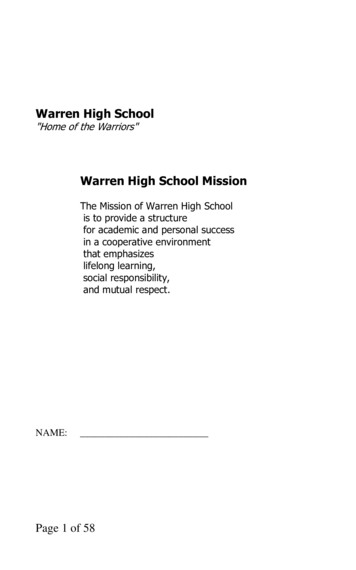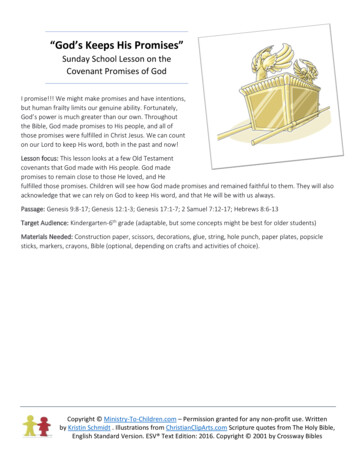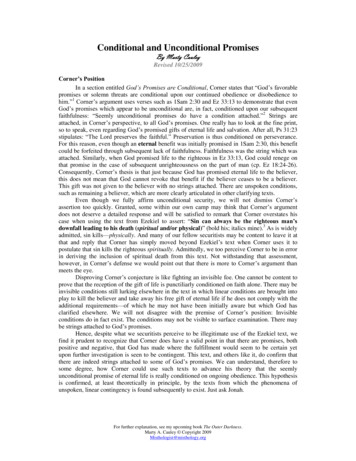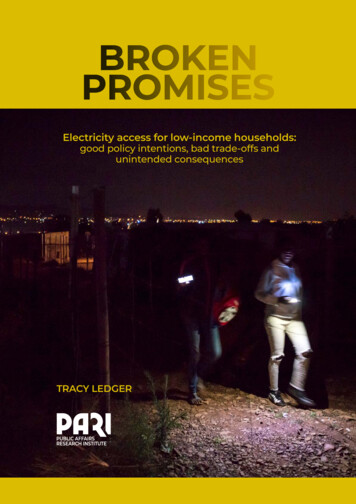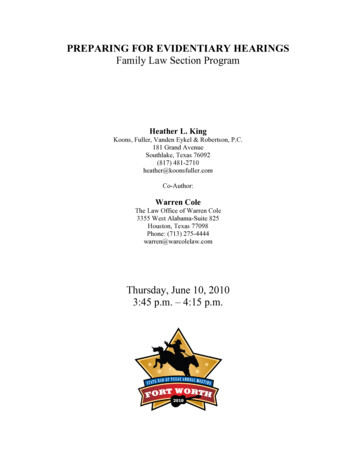
Transcription
Broken PromisesDecades of Failure to Enforce Labor Standards in Free Trade AgreementsPrepared by the Staff of Sen. Elizabeth Warren
Broken Promises:Decades of Failure to Enforce Labor Standards in Free Trade AgreementsPrepared by the Staff of Sen. Elizabeth WarrenExecutive SummaryThe Senate will soon vote on the BipartisanCongressional Trade Priorities and AccountabilityAct of 2015 – also known as “Fast Track.” PresidentObama has requested Fast Track authority fromCongress to ease the passage of the Trans-PacificPartnership (TPP), a massive trade agreement with12 countries that account for nearly 40% of the globaleconomy. President Obama has repeatedly stated thatthe TPP is “the most progressive trade bill in history”because it has high labor, environmental, and humanrights standards. The President claims the TPP willhave “higher labor standards, higher environmentalstandards,” and “new tools to hold countriesaccountable.” In 2007, U.S. Trade Representative SusanSchwab claimed that the Peru, Colombia,and Panama trade agreements contained“unprecedented protections for labor rights andenvironmental standards.” In 2010, President Obama said that the SouthKorea agreement included “groundbreakingprotections for workers’ rights.” In 2011, the White House insisted that theColombia trade agreement “include[d] strongprotections for workers’ rights, based on theMay 10, 2007, bipartisan CongressionalExecutive agreement to incorporate high laborstandards into America’s trade agreements.”President Obama said in 2012 that “thisagreement is a win for our workers and theenvironment because of the strong protectionsit has for both – commitments we are going tofulfill.” A few months later, the White House madenearly identical claims about the Panama FreeTrade Agreements.But proponents of almost every free trade agreement(FTA) in the last 20 years have made virtually identicalclaims: In 1993, President Clinton claimed that “theNorth American Free Trade Agreement[NAFTA] is the first agreement that ever reallygot any teeth in environmental standards, anyteeth in what another country had to do withits own workers and its own labor standards There’s never been anything like this before.” In 2005, U.S. Trade Representative RobPortman claimed, “[t]he [Central AmericanFree Trade Agreement] has the strongestlabor and environmental provisions of anytrade agreement ever negotiated by the UnitedStates.”Broken PromisesPrepared by the Staff of Sen. Elizabeth Warren1
However, the history of these agreements betraysa harsh truth: that the actual enforcement of laborprovisions of past U.S. FTAs lags far behind thepromises. This analysis by the staff of Sen. Warrenreveals that despite decades of nearly identical promises,the United States repeatedly fails to enforce or adoptsunenforceable labor standards in free trade agreements.Again and again, proponents of free trade agreementsclaim that this time, a new trade agreement hasstrong and meaningful protections; again and again,those protections prove unable to stop the worstabuses. Lack of enforcement by both Democratic andRepublican presidents and other flaws with the treatieshave allowed countries with weaker laws and standardsand widespread labor and environment abuses toundermine treaty provisions, leaving U.S. workers andother interested parties with no recourse. This analysisfinds: The United States does not enforce the laborprotections in its trade agreements. A seriesof reports by the non-partisan GovernmentAccountability Office (GAO), as well as reportsby the Department of Labor (DOL) and theDepartment of State, document significantand persistent problems with labor abuses incountries with which we have FTAs. WhileGAO acknowledged progress by partners inimplementing commitments and by agencies intracking progress and engaging on problems,their analysis concluded that the USTR andDOL “do not systemically monitor and enforcecompliance with FTA labor provisions,” andthat the U.S. agencies generally have not been“identifying compliance problems, developingand implementing responses, and takingenforcement actions.” The U.S. pursues very few enforcement actions.Prior to 2008, the Department of Laborhad not accepted a single formal complaintabout labor abuses in free trade agreements.Since then, the Obama administrationhas conducted in-depth investigations intocomplaints and issued fact-finding reports andrecommendations. However, DOL has acceptedonly five claims against countries for violatingtheir labor commitments, and it only agreedto restart the first ever labor enforcement caseunder any free trade agreement in 2014, sixyears after the initial claim was filed. Thisreveals both the cumbersome nature ofcomplaint process and the overall enforcementproblems with these agreements. Widespread labor-related human rightsviolations. The United States has 14 freetrade agreements with 20 countries. Whilesome of these countries have made progressin improving labor conditions, problems withlabor rights and other abuses are widespread.U.S. agencies or other investigators haveidentified significant problems with use ofchild labor or other labor-related human rightsabuses in 11 of the 20 countries. Failure to curb even the worst abuses. Casestudies of several countries that have signedU.S. free trade agreements reveal continuinghorrific labor abuses. Guatemala was named“the most dangerous country in the world fortrade unionists” five years after entering a tradeagreement with the U.S. In Colombia, despitethe existence of a special “Labor Action Plan”put in place to address long-standing problemsand secure passage of the Colombia FTA, 105union activists have been murdered and 1,337death threats have been issued since the LaborAction Plan was finalized four years ago.Broken PromisesPrepared by the Staff of Sen. Elizabeth Warren2
1. Introduction: Obama AdministrationClaims that the TPP Will be the MostProgressive Trade Agreement in HistoryThe Senate will soon vote on the BipartisanCongressional Trade Priorities and AccountabilityAct of 2015 – also known as “Fast Track.” PresidentObama has requested Fast Track authority fromCongress to ease the passage of the TPP, a massivetrade agreement among 12 countries that account fornearly 40% of the global economy. On numerousoccasions, President Obama has made claims that thefinal pact will be “the most progressive trade agreementin history” with regard to labor, environment, andhuman rights.1 For example, last month the Presidentdeclared:2“Here’s what I’m confident about: Thiswill end up being the most progressivetrade bill in history. It will have thekinds of labor and environmental andhuman rights protections that havebeen absent in previous agreements.According to USTR, the President “hasalways made clear that he will only support tradeagreements that include fully enforceable laborstandards,” and that the final agreement “will offer newtools to fight exploitative child labor and forced labor,deter employment discrimination, and will embedfundamental labor standards in our trade agreementwith Mexico and Canada.” 6Again and again, key Administration officialsmake similar claims. According to the White House,the “high standards” in this agreement “will not onlybring hundreds of millions of people under enforceablelabor standards and protect endangered wildlife inone of the fastest growing regions of the world—theywill also help level the playing field for workers andbusinesses here at home by ensuring our trade partnersare playing by the rules.”72. Promises about Previous Trade AgreementsFact Sheets from the White House echo the President’spromise:3“Through the Trans-Pacific Partnership weare renegotiating NAFTA and institutingstronger, fully enforceable labor andenvironmental standards. These highstandards will not only bring hundredsof millions of people under enforceablelabor standards and protect endangeredwildlife in one of the fastest growingregions of the world—they will also helplevel the playing field for workers andbusinesses here at home by ensuring ourtrade partners are playing by the rules.The promises that the Obama Administrationis making about the TPP are not new. For over twodecades, American Presidents from both politicalparties have promised that the trade agreementsnegotiated by their Administration would putAmerican workers first. From NAFTA and CAFTAto the recent deals with Peru, Colombia, Panama andSouth Korea, proponents of these trade agreementshave – again, and again, and again - made nearlyidentical promises.A. NAFTA Agreement under President ClintonIn 1993, President Clinton declared that:“The White House calls TPP the “greenesttrade agreement in history -- protecting oceans andcombating wildlife trafficking, illegal fishing, and illegallogging across a vast swath of the globe,”4 and claimsthat TPP will “raise labor standards” with “enforceablerequirements on minimum wages, hours of work, andoccupational safety and health.”5In all of trade history, [NAFTA] isthe first agreement that ever really gotany teeth in environmental standards,any teeth in what another country hadto do with its own workers and itsown labor standards There’s neverbeen anything like this before. 8Broken PromisesPrepared by the Staff of Sen. Elizabeth Warren3
U.S. Trade Representative Mickey Kantorechoed the President, saying that NAFTA “willserve as a model,” for future trade agreementsand pointing out that a trade agreement coveredworkers’ rights and the environment “for the firsttime.”9And at his remarks on the signing of theagreement in 1993, President Clinton said: “Theenvironmental and labor side agreements negotiatedby our administration will make this agreementa force for social progress as well as economicgrowth.”10B. CAFTA-DR Agreement underPresident George W. BushFact sheets from USTR said that CAFTA-DRwould go further than previous agreements on laborand environmental rights, stating that CAFTA-DRwould “create a three-part strategy on worker rightsthat will ensure effective enforcement of domesticlabor laws, establish a cooperative program toimprove labor laws and enforcement, and build thecapacity of Central American nations to monitorand enforce labor rights.” The environmentalchapter would be similarly innovative and “ensurethat views of civil society are appropriatelyconsidered, and for benchmarking of environmentalcooperation activities and input from internationalorganizations.”14C. Peru FTA under President BushTwelve years after NAFTA was negotiated,President George W. Bush made the DominicanRepublic-Central American Free Trade Agreement(CAFTA-DR) a central pillar of his trade policy.An agreement between the U.S. and several smallerdeveloping economies (Costa Rica, DominicanRepublic, El Salvador, Guatemala, Hondurasand Nicaragua), CAFTA-DR was portrayed byPresident Bush as “transforming our hemisphereinto a powerful free trade area,” to “promotedemocratic governance, human rights, andeconomic liberty for everyone.”11U.S. Trade Representative Portman statedthat “The CAFTA has the strongest labor andenvironmental provisions of any trade agreementever negotiated by the United States. CAFTAis light years ahead of NAFTA, more practicaland effective than current law, and is far strongerthan earlier agreements.”12 Ambassador Portmanclaimed that CAFTA-DR contained “cutting-edge,practical and effective” labor and environmentalprotections.13Two years after the CAFTA-DR agreement,President George W. Bush in 2007 finalized theUS-Peru Free Trade Agreement (PFTA). Pres.Bush lauded the “enforceable” new rules in thisagreement:15“Today’s action by the Senate alsomarks the approval of the first freetrade agreement that fulfills the May10 bipartisan trade agreement withCongress by incorporating enforceablelabor and environmental standards.U.S. Trade Representative Susan Schwab declaredthat the protections in the Peru FTA were“unprecedented”:“For nearly ten months the Bushadministration has worked withHouse and Senate leaders fromboth parties on a path forward forthese four free trade agreements.The bipartisan view we reachedin May will pull into these FTAsunprecedented protections for laborrights and environmental standards.16Broken PromisesPrepared by the Staff of Sen. Elizabeth Warren4
And, speaking before the House Committee onSmall Business, Deputy U.S. Trade RepresentativeJohn Veroneau praised the “cutting edge” labor andenvironmental standards, declaring that the rules“level the playing field” for American workers:17“[E]ach of these FTA partners agreedto incorporate stronger enforceablelabor and environmental standardsinto the trade agreements, puttingthem at the cutting edge of effortsto improve labor and environmentalconditions through trade.[T]heseagreements not only level the playingfield for American farmers, ranchers,manufacturers and service providers,they also strengthen intellectualproperty rights; promote transparencyand the rule of law; and safeguardlabor and environmental standards.D. South Korea, Colombia, and PanamaAgreements under President ObamaFTAs with Colombia, Panama, and SouthKorea were signed during the Bush Administrationand passed by Congress during the ObamaAdministration. President Obama and hisAdministration insisted that these agreements set anew bar for labor and environmental standards.In 2011, U.S. Trade Representative Ron Kirkechoed the President, and said that the South KoreaFTA had the “highest standards” for environmentaland labor protections, and invoked the “level playingfield” that a South Korean FTA would provide forAmerican producers.19“[T]he U.S.-Korea trade agreementhas the highest standards for theprotection of labor rights and theenvironment. It contains mechanismsfor the effective enforcement of laborand environmental laws, combinedwith strong remedies for noncompliance. As a result, the U.S.-Koreatrade agreement will provide a levelplaying field for American producersby upholding strong labor andenvironmental protections in Korea.Six months later, the White House claimedthat the Colombian FTA met and exceeded thehigh standards set by President Obama:20“In 2010, President Obama said that the SouthKorea agreement included “groundbreaking”protections for workers and the environment:18“I’m especially pleased that thisagreement includes groundbreakingprotections for workers’ rightsand for the environment. In thissense, it’s an example of the kindof fair trade agreement that I willcontinue to work for as President,in Asia and around the world.The [U.S.-Colombia FTA] includesstrong protections for workers’rights In addition, President Obamainsisted that a number of serious andimmediate labor concerns be addressedbefore he would be willing to send theAgreement to Congress As a result,the U.S. and Colombian governmentsannounced, on April 7, 2011, anambitious and comprehensive LaborAction Plan that included major, swiftand concrete steps for the Colombiangovernment to take [S]uccessfulimplementation of key elements of theAction Plan will be a precondition forthe Agreement to enter into force.Broken PromisesPrepared by the Staff of Sen. Elizabeth Warren5
In May 2012, President Obama certified thatthe FTA would enter into force, as Colombiahad taken steps to “ensure the protection of laborrights.” The President said that:21“[W]e approved an action plan to ensurethe protection of labor rights. We allknow that more work still needs tobe done, but we’ve made significantprogress. And as a result, and giventhe actions taken by President Santosand the Colombian legislature, I canannounce that the U.S.-ColombiaFree Trade Agreement will enter intoforce next month on May 15th .thisagreement is a win for our workersand the environment because of thestrong protections it has for both –commitments we are going to fulfill.The Obama Administration portrayed theColumbian FTA as consistent with America’s “corevalues” and echoed prior calls for “a level playingfield” for American workers: 22The Panama Free Trade Agreement wouldgo into effect a few months after the Colombiaagreement. Again, the Obama Administrationinsisted, the agreement would contain equallystrong protections for workers’ rights, and theAdministration praised the steps taken by thegovernment of that country to improve labor laws:23“The U.S.-Panama Trade PromotionAgreement includes strongprotections for workers’ rights, basedon the May 10, 2007 bipartisanCongressional-Executive agreementto incorporate high labor standardsinto America’s trade agreements.USTR’s fact sheet on the Panama agreementwas similarly laudatory, highlighting that theagreement will “[p]rotect [l]abor rights and the[e]nvironment.”24““The Obama Administration is pursuingan ambitious trade agenda that will helpour economy grow and support moreand better jobs for American workers.At the same time, the President hasmade clear that our trade agreementsmust be consistent with our core valuesand interests, including effectivelyprotecting workers’ rights, and enableAmerican workers and businessesto compete on a level playing field.To achieve these twin objectives,we must ensure that our tradingpartners meet basic labor standardsand protect basic labor rights.Both Parties are also required toeffectively enforce – and may not waive– labor laws related to fundamentallabor rights. Both Parties also committo effectively enforce their owndomestic environmental laws andadopt, maintain, and implement laws,regulations, and all other measures tofulfill their obligations under coveredmultilateral environmental agreements.Broken PromisesPrepared by the Staff of Sen. Elizabeth Warren6
“3. Broken Promises: Failure to AdequatelyEnforce Free Trade AgreementsSince 2008, the Department of Labor(DOL) has accepted five formalcomplaints. . about possible violationsof FTA labor provisions and hasresolved one . for each submission,DOL has exceeded by an averageof almost 9 months its 6-monthtime frame for investigating FTArelated labor submissions and issuingpublic reports, showing the timeframe to be unrealistic. Also, unionrepresentatives and other stakeholdersGAO interviewed in partner countriesoften did not understand the submissionprocess, possibly limiting thenumber of submissions filed. Further,stakeholders expressed concerns thatdelays in resolving the submissions,resulting in part from DOL’s exceedingits review time frames, may havecontributed to the persistence ofconditions that affect workers and areallegedly inconsistent with the FTAs.A series of reports by government auditors andother experts - combined with case-by-case analysesof labor, environment, and human rights problems incountries that are partners in free trade agreementswith the United States - reveals that despite promisesmade by Presidents from both parties, free tradeagreements have often failed to resolve or prevent abusesin countries that are parties to the agreements.A. GAO FindingsIn 2014, the GAO conducted a thoroughassessment of U.S. implementation of key laborprovisions in our existing free trade agreements.Although GAO noted that some conditions hadimproved in the countries that were subject tofree trade agreements, the investigators foundwidespread and persistent problems. According tothe study:25“U.S. agencies reported, and GAOfound, persistent challenges to laborrights, such as limited enforcementcapacity, the use of subcontractingto avoid direct employment, and,in Colombia and Guatemala,violence against union leaders.Even when DOL receives formal complaintsalleging that free trade agreements have beenviolated, action is slow and ineffective. Priorto 2008, DOL had not accepted a single formalcomplaint. DOL has since conducted indepth investigations into each of the complaintsand issued fact-finding reports and associatedrecommendations. However, GAO found thatDOL since 2008 has only resolved one of fivesubmitted complaints, that DOL is unable to meetkey deadlines, and that many stakeholders are noteven aware of the process for submitting complaints.According to GAO: 26These problems were not new -- many wereidentified in 2009 in a similar GAO report, andat the time key Administration officials vowed totake action.27 GAO closely tracked agency actionsfor four years and documented some improvement.The 2014 report acknowledged progress by partnersin implementing commitments and by agenciesin tracking progress and engaging on problems,but still identified significant problems with theseefforts. GAO concluded that USTR and DOL “donot systemically monitor and enforce compliancewith FTA labor provisions,”28 and that the U.S.agencies generally have not been “identifyingcompliance problems, developing and implementingresponses, and taking enforcement actions.”29Broken PromisesPrepared by the Staff of Sen. Elizabeth Warren7
B. Department of Labor and Department ofState Reports on Child Labor, TraffickedPersons, and Human Rights.Every year, DOL publishes a report to Congresson goods produced by child labor and forced labor,and the Department of State publishes humanrights reports on every country in the world. Thesereports show significant problems with manycountries that have U.S. FTAs in effect, despitepromises from leaders that these agreements wouldprotect workers and create “a level playing field.”For example, the DOL reports identify tencountries with which the U.S. has existing freetrade agreements - Colombia, Dominican Republic,El Salvador, Guatemala, Honduras, Jordan, Mexico,Nicaragua, Panama, and Peru - that continue toproduce goods with child labor or forced labor inviolation of international law.30 The report furthershows that Colombia produces eight differentproducts – clay bricks, coal, coca, coffee, emeralds,gold, pornography, and sugarcane - using child orforced labor. Guatemala produces broccoli, coffee,corn, fireworks, gravel, and sugarcane with childlabor. Mexico produces eleven different productswith child labor.For example, the report identified “exploitationof child labor” in Mexico;32 and in Honduras theDepartment of State reported that serious problemsincluded the ineffective enforcement of laborslaws; and child labor,” and “institutional weaknessof the judicial system leading to widespreadimpunity.”33 In Jordan, the report stated that “Thegovernment restricted labor rights, and local andinternational human rights organizations reportedhigh levels of abuse of foreign domestic workers,”and that “Impunity remained widespread, and thegovernment did not take sufficiently strong stepsto investigate, prosecute, or punish officials whocommitted abuses.”34C. Detailed Examples of Failed FreeTrade Agreement EnforcementSimilarly, the Department of State publishesannual human rights reports on every country inthe world.31 These reports include informationon workers’ rights. In 17 countries with which theU.S. has free trade agreements in effect, the reportsidentified human rights violations directly related tolabor rights and the conditions of workers. In 10 ofthese countries - Colombia, Dominican Republic,El Salvador, Guatemala, Honduras, Jordan, Mexico,Morocco, Nicaragua, and Panama - the reportsidentified problems related to workers’ rights andimpunity for those responsible for human rightsviolations.I. PERU FREE TRADE AGREEMENT BROKEN PROMISESThe U.S. Free Trade Agreementwith Peru entered into force in 2009. Thisagreement, the United States-Peru TradePromotion Agreement (PTPA), includeswhat USTR describes as “groundbreakingprovisions concerning the protection ofthe environment and labor rights.”35 Butsince the PTPA entered into force in 2009,Peru has reportedly used child labor andforced labor in a wide array of industries;Peru continues to export illegal timber fromthe Amazon; and in 2014, Peru undertooka massive rollback of its environmentalprotections and health and safety regulationsfor workers to induce foreign investment.According to DOL, significant numbersof bricks, coca, fireworks and fish productsexported from Peru are produced by children,Brazil nuts and timber products are producedby forced labor, including trafficked persons,and gold products are produced by bothchildren and forced labor.36Broken PromisesPrepared by the Staff of Sen. Elizabeth Warren8
Similarly, numerous sources havetracked the boom in illegal logging and oilconcessions in Peru since the PTPA. A 2012report from the Environmental InvestigationAgency identified 100 shipments of illegallogs from Peru to the United States in thetwo and a half years following congressionalpassage of the PTPA.37 A 2014 study foundthat despite PTPA’s provisions against illegallogging, nearly 70 percent of all loggingconcessions in Peru are currently suspected ofserious violations.38 This study concluded:“[T]he U.S.–Peru Trade PromotionAgreement (TPA), which enteredinto force in February 2009,contained an important annexaimed at strengthening Peru’sforest sector governance andsustainable management of forestresources. Despite these efforts, itis increasingly clear that sustainableforestry has yet to be attained andillegal logging continues to plaguethe Peruvian Amazon after entryinto force of the U.S.-Peru TPA.39In July 2014, Peru enacted a package oflaws that rolls back occupational health andsafety standards, removes key enforcementpowers from Peru’s environment ministryand weakens environmental assessmentrequirements in the name of promotinginvestment.40 The law limits penaltiesthat can be placed on companies for health,safety, and environmental violations.41 Labor,environmental and other civil society groupshave criticized the rollbacks, stating that theyconstitute clear violations of PTPA.42 Thesegroups also asked USTR to try to use thePTPA’s enforcement provisions to halt therollbacks. Indeed, these rollbacks came afterPeru had already been called out for lackof compliance with the 2009 standards.43Nonetheless, the only action taken by USTRhas been to “monitor” the situation.44II. COLOMBIAN FREE TRADE AGREEMENT BROKEN PROMISESWhen Congress passed the ColombiaFTA in 2011, President Obama said that theagreement would “protect labor rights, theenvironment, and intellectual property.”45 TheAdministration also touted a separate “LaborAction Plan” which detailed a series of stepsthat the Colombian government agreed totake in order to address the Administration’sconcerns regarding “violence againstColombian labor union members; inadequateefforts to bring perpetrators of murdersof such persons to justice; and insufficientprotection of workers’ rights in Colombia.”46But neither the FTA nor the LaborAction Plan have resulted in significantadvances in labor rights. Last year, FreedomHouse noted that the Plan “called forenhanced investigations of rights violationsand stepped-up enforcement regardingabusive labor practices, but it has resulted inonly minor improvements.”47 According toColombia’s National Union School, the grouprecognized in the LAP as an authoritativesource of monitoring data, 105 union activistshave been murdered and 1,337 death threatshave been issued against unionists since theLAP was finalized four years ago, 48 and theState Department found that as of 2013, “thepace of investigations and convictions [forunionist killings] remained slow and highrates of impunity continued.”49USTR and DOL acknowledge that“significant challenges” remain in Colombia’sefforts to enforce its labor laws – of the 110labor-related homicides reported by theColombian government since 2011, therehave been only four convictions, and while thenumber of threats against labor leaders andactivists has actually increased in the last fouryears, no threat case has been successfullyresolved.50 The State Department also notedthat “fines assessed by the government didlittle to dissuade violators, since fines wereoften not collected, and many companieschose to appeal rather than pay the fines.”51Broken PromisesPrepared by the Staff of Sen. Elizabeth Warren9
The AFL-CIO concluded that, “Fines leviedserve more as public relations successes for theMinistry of Labor than acts of enforcementcapable of exerting pressure to change thefraudulent behavior of employers” and thatthe hiring practices for labor inspectors“severely [affect] autonomy and technicalcapacity.” 52Child labor also appears to be anongoing problem in Colombia. In 2013,the State Department reported “significantincidences” of child labor occurring in theproduction of clay bricks, coal, emeralds,gold, coca, and pornography. The StateDepartment’s report also noted thatprohibitions against children working inmining and construction “were largelyignored.”53III. BROKEN PROMISES IN GUATEMALA (CAFTA SIGNATORY)CAFTA-DR went into effect withGuatemala in 2006. Seven years later,Guatemala was named by the InternationalTrade Union Confederation (ITUC) as “themost dangerous country in the world for tradeunionists.”54 According to ITUC, since 2007,“at least 53 union leaders and representativeshave been killed, and there have beennumerous acts of attempted murder, torture,kidnapping, break-ins and death threats,which have created a culture of fear andviolence where the exercise of trade unionrights becomes impossible.” 55In 2008, under then-President Bush,the AFL-CIO and six Guatemalan labororganizations filed a submission to DOLalleging that the Guatemalan governmentwas failing to effectively enforce its laborlaws and comply with ILO standards. InJanuary 2009, days before President Obama’sinauguration, DOL issued a report inresponse to the submission and identifieda number of troubling issues, including theinability of the Guatemalan Ministry ofLabor to conduct inspections or sanctionemployers for labor rights violations and“serious problems with respect to theenforcement of court orders.”56In 2010, DOL deemed Guatemala’sactions over the previous 18 months as“insufficient to address the concerns raised inthe report” and the Obama administrationinitiated an enforcement case againstGuatemala, the first such case under anyfree
serve as a model," for future trade agreements and pointing out that a trade agreement covered workers' rights and the environment "for the first time."9 And at his remarks on the signing of the agreement in 1993, President Clinton said: "The environmental and labor side agreements negotiated by our administration will make this agreement


